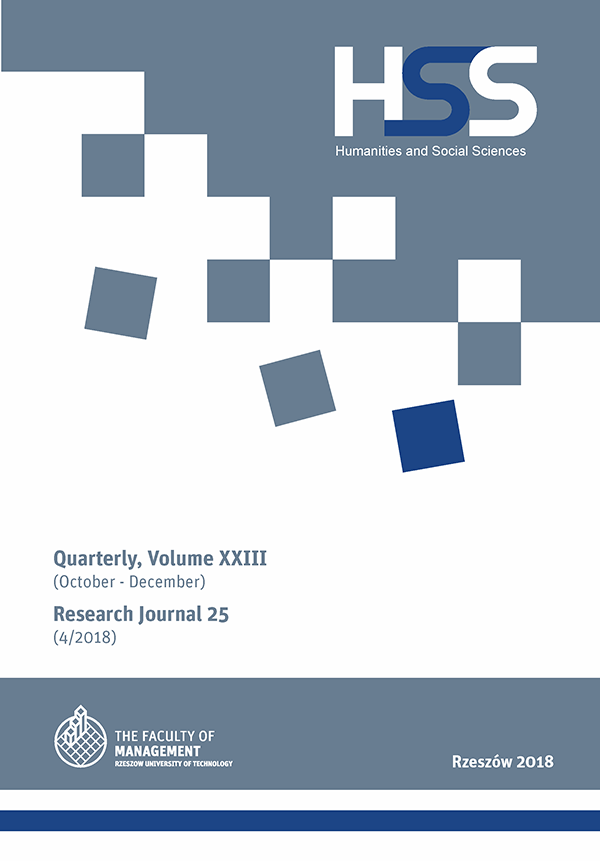Abstrakt
The risk of delays in receivables repayment or their complete loss constitute one of the key risks that entrepreneurs are currently exposed to. Risk attitudes in their group are shaped by many factors that differ significantly. Their systematization and correction allow creating guidelines for the processes of managing the risk of losing receivables that are used in practice. They are aimed at ensuring safe and thus stable functioning of enterprises in conditions of limited risk. In the paper, out of all the risks encountered, the risk of losing receivables was separated and presented against the background of others, but it was pointed out that the process of managing them in the case of individual entities may differ significantly and be determined by their specificity. In the summary of theoretical considerations, the results of own research conducted in the business environment regarding the awareness of the occurrence of particular types of risk and the consequences of their implementation were presented. They made it possible to obtain opinions on issues related to risk management, with particular emphasis on those related to risk management connected with the use of deferred payment terms. An important part of the considerations was devoted to the characteristics and an analysis of actions taken to eliminate or limit the consequences of the implementation of the risk of loss of receivables as part of the risk management processes implemented.
Bibliografia
Bromiley P., Mcshane M., Nair A., Rustambekov E., Enterprise Risk Management: Review, Critique and Research Directions, Long Range Planning, 2015, No. 48/4.
Dankiewicz R., The Role of Merchant Credit Insurance in Processes Stimulating the Economic Security of Companies [in:] Economics, Entrepreneurship, Management, Lviv Polytechnic, Lviv 2017.
International Credit Insurance&Surety Association, A Guide to Trade Credit Insurance, Anthem Press, New York 2015.
Jedynak P., Ubezpieczenia gospodarcze. Wybrane elementy teorii i praktyki, Księgarnia Akademicka, Kraków 2001.
Jones P.M., Trade credit insurance, Primer Series on Insurance, The World Bank, Issue 15, 2010.
Krzemińska D., Finansowe znaczenie odpowiedzialności dla przedsiębiorstwa udzielającego i wykorzystującego kredyt kupiecki, [in:] Finanse, banki i ubezpieczenia w Polsce u progu XXI wieku, vol. V, Finanse przedsiębiorstw, Wydawnictwo AE, Poznań 2000.
Lisowski J., Możliwości zabezpieczania przedsiębiorców przed następstwami ryzyka kredytowego [in:] Studia z ubezpieczeń gospodarczych i społecznych, Zeszyty Naukowe, Seria I, z. 276, Wydawnictwo AE, Poznań 2000.
Löffelholz J., Repetitorium der Betriebswirtschaftslehre, Betriebswirtschaftschaftlicher Verlag, Weisbaden 1971.
McNeil A.J., Frey R., Embrechts P., Quantitative risk management: concepts, techniques and tools, Princeton University Press 2015.
Nowak C., Ochrona ubezpieczeniowa wybranych ryzyk bankowych, „Wiadomości Ubezpieczeniowe” 1999, No. 5–6.
Rejda G.E., Principles of Risk Management and Insurance, Harper Collins College Publishing 1995.
Samecki W., Ryzyko i niepewność w działalności przedsiębiorstwa przemysłowego, PWE, Warszawa 1967.
Williams C.A., Smith M.L., Young P.C., Risk management and insurance, McGraw-Hill Publishing, New York 1998.
Williams C.A., Smith M.L., Young P.C., Zarządzanie ryzykiem a ubezpieczenia, PWN, Warszawa 2002.
Woźniak D., Sokołowska-Woźniak J., Jankowiak B., Cwynar A., Cwynar W., Ostrowska-Dankiewicz A., Dankiewicz R., Trade credit in polish companies an empirical analysis of macroeconomic factors influencing payment delays [in:] Business and non-profit organizations facing increased competition and growing custamers demands, ed. A. Nalepka, A. Ujwary-Gil, Nova Sandec 2018, Vol. 17.

